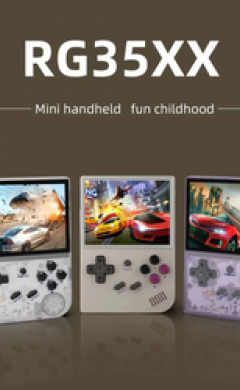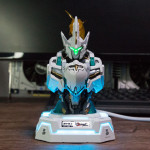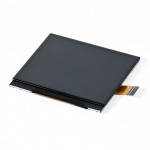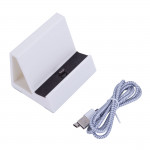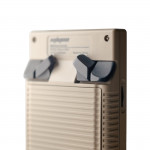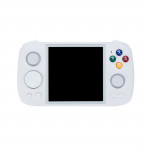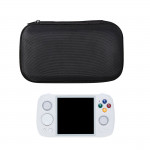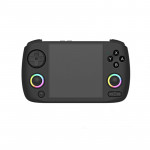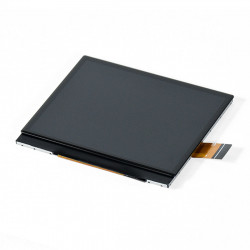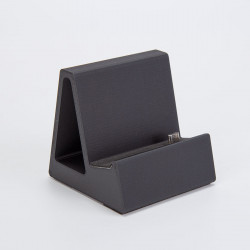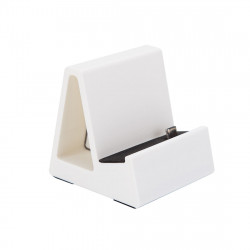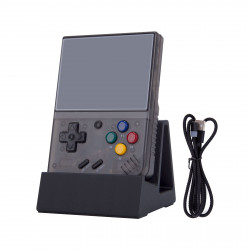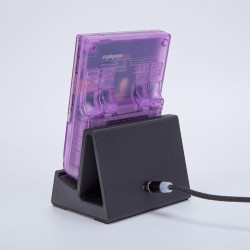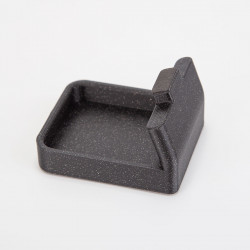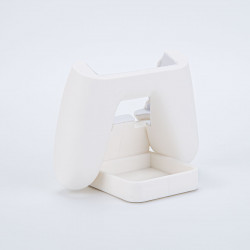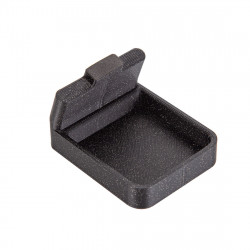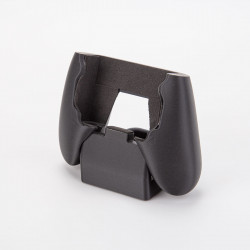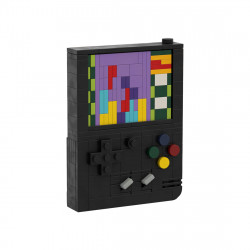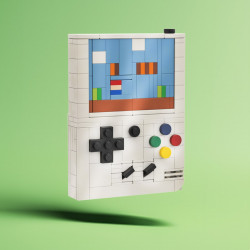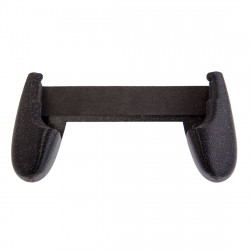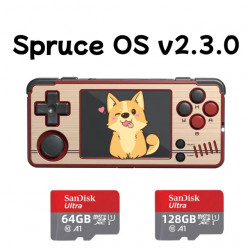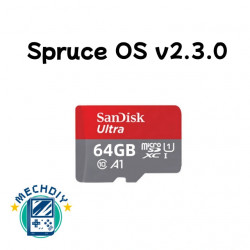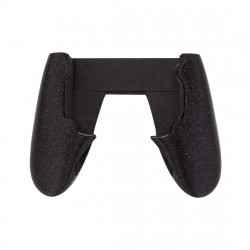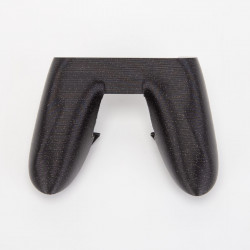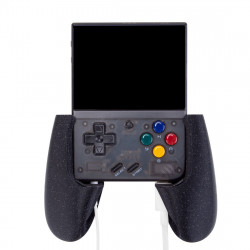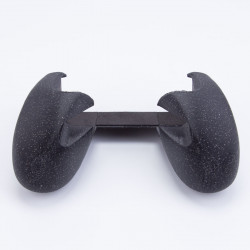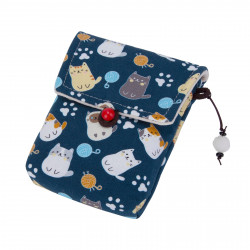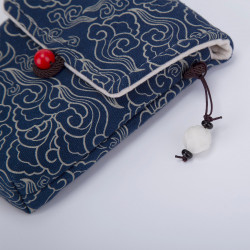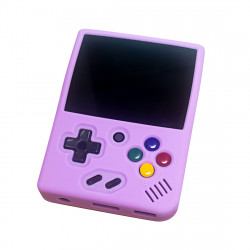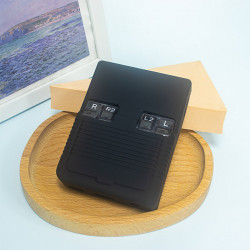Miyoo
Miyoo Mini Plus Console Review: A Reminder That Bigger Isn't Always Better
Last year, the Miyoo Mini retro gaming handheld was a surprise hit. However, it had one major issue.
They were constantly selling out within minutes because of high demand. If you didn't spend your whole day monitoring stock, it would almost always sell out and be nearly impossible to purchase the console. The company's answer to that issue is the Miyoo Mini Plus, but an enlarged design has brought another fatal flaw: a larger screen.
For two reasons, the original Miyoo Mini took a lot of work to locate. Above all, for about $60, it was a fantastic casual gaming device that captured the essence of the original Game Boy in a much more compact, portable format. It could emulate vintage games, including those from the original PlayStation.
However, the company found it extremely difficult to reliably get the 2.8-inch, 640 x 480 screen for the Miyoo Mini. You have a great handheld that everyone wants to get, but your company needs help producing enough of them. Numerous gamers became frustrated as it was a surefire way to be disappointed.
The Miyoo Mini Plus is the company's second attempt at a product rather than an update to the original Miyoo Mini. The Miyoo Mini 2 was released more than a year after the original version. This delay gave competitors the opportunity to release their own retro gaming handhelds.
The Miyoo Mini 2 is now easily found in stores. It is now widely available in stores. Even though I like the Miyoo Mini, I would not choose the Plus over the original because of the poor quality of the screen.
Familiar Hardware With Some Welcome Improvements
The 2.8-inch LCD screen of the Miyoo Mini Plus has been upgraded to a 3.5-inch screen, making it a slightly larger handheld that is much more comfortable to carry and use than the original.
Compared to the original Miyoo Mini (right), which had a 2.8-inch LCD screen that made manufacturing the handheld challenging, the Miyoo Mini Plus (left) has a larger 3.5-inch LCD screen.
Although I have played many games on the original Miyoo Mini over the past year, my hands still get cramped after about 30 minutes of use. I will acknowledge that I have larger hands than most people. The D-pad and action buttons on the Miyoo Mini Plus are the same size as the original. Still, they are slightly more widely spread, significantly improving the handheld's comfort when used for extended gaming sessions.
Although the Miyoo Mini Plus (bottom) is marginally thicker than the Miyoo Mini (top), this only facilitates gripping the more oversized handheld.
In addition, the Miyoo Mini Plus is somewhat thicker than the original, which makes it marginally less portable. However, this extra thickness is a good compromise because the extra mass made it easier for my hands to hold. Like the previous year's model, the Miyoo Mini Plus has three ports on the bottom:
- A USB-C charging connector.
- A headphone jack.
- A microSD slot that stores the OS and games.
Compared to the Miyoo Mini (right), the Miyoo Mini Plus (left) has shoulder buttons on the back that are significantly easier to press and have a more prominent J-shape design.
The recipe didn't change all that much between the original Miyoo Mini and the new Plus version, except for being more extensive, but there are a few other minor enhancements I've grown to love. The Miyoo Mini Plus has two shoulder buttons on the back. These buttons now have a J-shaped design. This design makes them easier to hold with my fingertips.
The shoulder buttons on the Miyoo Mini Plus are easier to tell apart. The inner pair is slightly higher than the outer pair.
This difference in height makes it easier to distinguish them by touch. This makes it easier to differentiate them by touch. Although it's a little design tweak, it significantly improves the playability of games from the 16-bit era, when gamepads and controllers got shoulder buttons.
The rocker-style button on the Miyoo Mini Plus (bottom) has replaced the analog volume wheel found on the Miyoo Mini (top), enabling it to be utilized for additional purposes, such as adjusting the screen brightness.
The last notable update I also appreciated was the replacement of the analog wheel for the volume control with a rocker button. The Miyoo Mini Plus has volume buttons on the side.
These buttons can be used for different purposes, such as changing the screen's brightness. However, adjusting the volume quickly is much easier with a thumbwheel. However, using a thumbwheel to adjust the volume quickly is much easier.
No Performance Gains, But You’ll Want to Ditch That Stock OS As Fast As You Can
The slightly more extensive battery of the Miyoo Mini Plus doesn't increase the time you can play because of the bigger screen. The handheld's 1.2GHz CPU and 128MB of RAM are the same as the original's. Thus, in terms of performance, the Miyoo Mini Plus can run classic games that go back to the first Atari models and even the PlayStation.
When choosing which games to imitate, the PS1 is a safe cutoff because the Miyoo Mini Plus doesn't have analog controls. However, you might find some success with less demanding games from subsequent systems, including the Sega Dreamcast.
Although Miyoo Mini Plus Onion OS isn't yet officially available, you can install a beta version of the OS to enhance the user interface of the handheld significantly.
The Miyoo Mini Plus has a Linux-based operating system. This makes it easier to use RetroArch for playing game emulations.
Fortunately, you don't have to use it even though it is unattractive. The Miyoo Mini became popular because of its loyal fans. These fans developed miyoo mini plus Onion OS, a unique operating system made just for the device.
OnionOS improved the Miyoo Mini by adding interchangeable themes and optimizing RetroArch for its hardware. Now, the handheld has a polished look similar to products from big companies like Nintendo.
Additionally, it is free. However, as of this writing, OnionOS is only officially supported by beta releases; to install it on the Miyoo Mini Plus, you'll need to use a beta release. Other than that, the software has worked flawlessly for me.
The Original Miyoo Mini vs The New Miyoo Mini Plus?
This question could be more straightforward since the original Miyoo Mini is no longer being produced. The company has fully committed to the Miyoo Mini Plus and has given up on finding a source for the handheld's 2.8-inch screen. However, if you're prepared to pay a premium, you can still see the smaller Miyoo Mini on websites like eBay, as scalpers had a field day with the original. But ought you to?
Although the original Miyoo Mini (left) screen wasn't the best, it still looks far better than the one on the larger Miyoo Mini Plus (right).
I like the bigger size of the Miyoo Mini Plus for gaming. However, I am not satisfied with the quality of its 3.5-inch, 640 x 480 LCD screen. Others share the same opinion. Other people have complained about display problems in several forums, but my main gripe is that it looks terrible.
I made changes to the OnionOS settings to improve color accuracy. However, games like Yoshi's Island for the SNES still look muddy, lack saturation, and are unattractive. It does have slightly better viewing angles than the screen on the original Miyoo Mini.
While the Miyoo Mini Plus screen quality has no bearing on gameplay, games appear far friendlier on the original Miyoo Mini. Though I'm not sure if spending $200 on an out-of-production Miyoo Mini is a better option, it's a deal breaker for me.
Miyoo Mini Plus vs Anbernic RG35XX?
As mentioned before, the makers of the Miyoo Mini had trouble keeping up with demand. Meanwhile, companies like Anbernic have been making great portable game consoles for under $100 for a while now. They saw an opportunity with the shortage and high demand."
The peculiarly called Anbernic RG35XX, released earlier this year, was the outcome. I was impressed with the quality and performance of the hardware, which cost $65, when I reviewed it in March. However, I was unsure about recommending it because the Miyoo Mini Plus was still coming soon."
The Anbernic RG35XX has bigger J-shaped shoulder buttons than the Miyoo Mini Plus. This makes them easier to press with your fingertips. The buttons on the Anbernic RG35XX are more comfortable. The Miyoo Mini Plus has smaller shoulder buttons.
After testing both systems, I have concluded that the Anbernic RG35XX is the superior option. The device now has better controls. These include large shoulder buttons.
There are also two microSD card slots for organizing game and OS files. Additionally, there is a Mini-HDMI port for playing games on a bigger screen. It performs on par with the Miyoo Mini Plus, simulating thousands of retro games up to the PS1 era.
Sadly, the wonderful OnionOS isn't compatible with the Anbernic RG35XX. However, you can replace the front-end and stock OS with GarlicOS, a far superior substitute created by Black-Seraph. While it's not nearly as stable as OnionOS, it still makes the RG35XX look great and streamlines and improves RetroArch.
Both have 3.5-inch LCD screens. The Anbernic RG35XX screen is better than the Miyoo Mini Plus screen in terms of quality, brightness, and color saturation.
The Anbernic RG35XX screen is on the right side. The Miyoo Mini Plus screen is on the left side. The Anbernic RG35XX screen outshines the Miyoo Mini Plus screen.
However, the significantly better screen of the Anbernic RG35XX—a few dollars less expensive than the Miyoo Mini Plus—makes it a better purchase. When comparing the two, the display on the Miyoo Mini Plus looks terrible next to the RG35XX's. It's like I forgot to take off the tinted screen protector. (One didn't exist.)
The screen on the RG35XX isn't the best Anbernic has ever put on a device. Still, it performs significantly better than the Miyoo Mini Plus, which, in my opinion, makes choosing between the two simple: get the Anbernic RG35XX.
Miyoo Mini Plus Setup Guide
Recommended Accessories
- MicroSD Card: You would be fine with 128GB or 256GB, given the platforms on which this runs.
- MicroSD Card Reader: The UGREEN SD Card Reader
- Charger: UGREEN 65W Charger (charges via USB-A connector)
Initial Setup Guide
Everything will be time-dated, just like my other setup guides, so feel free to hop around to the locations you require. I recommend starting from the beginning, though, if this is a new device to you since you might miss anything.
As the video's title already tells you, we will use OnionOS as our operating system. If you want to stick with the stock operating system, this instruction is for someone else. Then why OnionOS? It is currently the most feature-rich, best-community-supported, and finest operating system for the Miyoo Mini Plus.
Preparation
Before we begin, you must have a branded SD card and a card reader. The stock SD card and reader that came with it should be thrown away; this also applies to the ROM card. For anyone who has not seen my earlier films, the SD cards and ROMS are unbranded, of poor quality, and prone to failure.
Unlike the Anbernic devices, the Miyoo only has one SD card port. Therefore, I recommend getting a 128GB SD card. You will also need an SD card reader.
Your BIOS library and ROM are the final things you need. The Tiny Best Set is something you can get on Google if you want a large list of games that you can then choose which ones to play. If you would like, read the instructions and download the version corresponding to the size of your SD card and the artwork. Since OnionOS now has built-in scraping, the artwork is optional, but if you have a big library, it saves a tonne of time. When we reach that stage, you can drag, drop, and go because the folders in the zip are already configured to function with OnionOS. Here's a link to the folder names that OnionOS requires.
Your ROMS, BIOS files, SD card, and SD card reader are ready to use. Let's proceed.
Software
The only piece of software we require is Rufus. Download the portable Rufus utility by visiting the Rufus website. To prevent problems, this will assist us in formatting our SD card as FAT32, particularly if it is larger than 32GB.
Firmware
Okay, so this is significant. After turning on your Miyoo, go to settings and verify the firmware version. Before doing anything else, we must update your firmware to version 202303262339 or below (the numbers represent dates). Make sure to include this step. If that firmware is installed, you can proceed to the following phase without risk.
When your device is off, download the firmware zip file from this link (https://www.sugarsync.com/pf/D4978471_09235444_837617). Unzip the file.
Verify that the SD card has the FAT32 format. If not, adhere to the guidelines below. You can skip this if it is.
Firmware Upgrade
Use the SD card reader to connect your SD card to your computer. Please verify that the device indicated in Rufus is the SD card you connected; it should be the same size as the disc. Now select Nonbootable under boot selection. I left mine as the drive size, which is 128GB, but you may change it to anything you choose. Next, verify that the file system is FAT32 or Large FAT32 by looking towards the bottom. Click Start. To get started, click "yes" to all of the cautions that may appear regarding partitions, data, etc.
Your SD card will be formatted as FAT32 and should be speedy.
After we extracted the sugarsync.com zip file, copy and paste the—image file onto the root of your MicroSD card. After turning off the Miyoo Mini Plus, insert the SD card and connect a USB charging cord. Please verify that the USB charging cable is not USB C to USB C and that the maximum voltage of the charger it is connected to is 5V. Please don't disconnect the charging cable; the rocket icon will appear in a few seconds while it upgrades. You can safely remove the charging wire once you see the charging icon.
Formatting your SD card
We will repeat the same procedures.
Use the SD card reader to connect your SD card to the computer. The card should now be formatted as FAT32.
Please verify that the device indicated in Rufus is the SD card you connected; it should be the same size as the disc. Now select Nonbootable under boot selection. After that, you can check near the bottom to ensure the file system is FAT32 and modify the volume label to anything you like. Click Start. To get started, click "yes" to all of the cautions that may appear about partitions, data, etc. Your SD card will be formatted as FAT32 and should be speedy.
One strange thing. Don't worry; it's a false positive. You may see a Windows Defender popup regarding a possible problem with the autorun files. However, we don't require those files, so go to the SD card drive and remove the existing autorun files.
Installing OnionOS
All right, now that the SD card is prepared, let's obtain our operating system files. Visit this Github link to download the most recent version. Onion-vX.X.X.zip should be listed under Assets in the most recent post. Get that.
Alright, take the zip file we just downloaded and transfer it to the SD card by cutting and pasting it. After extracting it here, make sure that the following seven directories are visible at the root of the SD card: tmp_update, BIOS, Media, miyoo, miyoo354, RetroArch, and Themes. If you can't see all seven, Check your file explorer settings to display hidden files. Remove the zip file. The SD card can now be safely ejected.
After turning off your smartphone, insert the SD card and switch it back on. Give it a few minutes to work, and the screen will appear with a heart and a thank-you message. We reach the main screen after a few iterations of A to Next. If you'd like, take note of the hotkeys, which are the menu button and any other button that can be used to obtain the combination.
First Start-Up
Now that we're on the validated screen let's select the emulators we'll be using so that the program can add them and create the necessary folders for our Roms. Choose what you'll use from the list; don't worry, you may add or remove more later if you'd like.
The apps, which are essentially additional functions and programs to improve your gadget, come next. I selected the clock, although, as I'll demonstrate later, it's unnecessary because the gadget has it built in. Excellent options include File Explorer, FTP Server, GameSwitcher, HTTP files server, Onion OTA update, and Random Game. You may add them later and test them all if you'd like, so feel free to use them.
Pressing the Start button summarizes all the emulators and apps you have selected. If you press Start again, it will install them and reboot.
Adding Roms & BIOS
Now, let's add our bios files and ROMs. After turning off the device, remove the SD card and reconnect it to your computer.
Thus, this is quite simple. All folders in the Tiny Best Set that I previously displayed have the correct names. If you install the appropriate emulator using the package manager, it will appear on the device. Move your Rom folders into the Roms directory by copying and pasting them. Verify that the platform folder contains the files, not additional directories and that the folder name is correct. If I navigate to the GBA folder, I see my games, not other folders.
Copying your BIOS files into the BIOS folder is the same procedure for BIOS. There are no subdirectories. Therefore, you would copy that bin file directly into the BIOS folder for a Playstation 1, which is necessary. That's all.
Refresh Game List
After everything is loaded, safely remove your card and insert it back into the device. Mine recognizes everything immediately, but if you still need to, you may refresh your Roms by pressing pick in the games tab of the main menu.
Artwork
Okay, let's get some thumbnails now. If it weren't for WiFi, I would have to re-teach you how to use the Skraper application. Access any platform; I'll begin with Gameboy. To access Scraper, scroll down and press the Y button. You now have four choices: quit, configure, just this game, or scrape the full Gameboy list. We'll go to configuration now.
If we check the sources, you'll see three possibilities; if we leave them checked, that's fine. Creating a screenscraper.fr account and entering your username and password here is the next step I would recommend, especially if you have a sizable library. To display a keyboard, press the X button. Since this is a patience test, I use the keyboard word sparingly. This stuff would drive even Ghandi insane. Save yourself the agony and don't try to erase the letter if you make a mistake. Instead, press X to close the keyboard and then B to depart, then return and try again until you get it just right. Making this was driving me crazy, and now that I'm seeing it again while editing, I'm suffering from severe PTSD.
Once you have entered your username and password correctly, press A to return to the configuration screen. The ability to allow background scraping is now available. Scraping takes a very long time, and you will want to do other things in the interim. Just be advised that certain games will run more slowly during this time because it does put some strain on the CPU. Return to the main menu, then delete every Gameboy rom.
Thumbnails will then appear on the right side of your list of games. Do this again for every platform you own.
Themes
You can switch between the themes installed on the device to choose a theme you prefer. This is an excellent method to personalize your gadget further.
Power Button
The operation of the power and menu buttons is the final topic I want to discuss. When you press the power button, the device enters sleep mode, turning off the screen and disabling the buttons. Your battery will deplete in this mode because it does not enter a low-power condition. However, if you hold down the power button, a popup stating that it is preserving your state and shutting down will appear. You can immediately resume playing your game if you press and hold the power button to turn it back on. Thus, turn off everything else and use sleep mode for brief periods.
If you have Gameswitcher loaded, as we previously had, pressing the menu button preserves your current state and launches Gameswitcher, making it simple to switch between games. If you press the pick button, you can see how much time you've spent playing that game at the top of this screen. You can return to the menu by holding the menu button to save the state.
Now, start playing games and enjoy yourself. That's all you need to accomplish for everyday use, which was the guide's primary focus. Once you're up and going, everything is at your discretion.
Miyoo Mini Plus FAQ
Welcome to our blog with frequently asked questions about the Miyoo Mini Plus mobile gaming gadget! This portable retro gaming gadget allows you to play various vintage console games. Because of its small size and unique features, the Miyoo Mini Plus has gained popularity among gamers who like to play classic games on the go. In this blog, we will address some of the most common queries regarding the Miyoo Mini+.
1. What colours are available for Miyoo Mini Plus?
The Miyoo Mini Plus is available in White, Grey, Transparent Purple, and Transparent Black.
2. How is the screen on Miyoo Mini Plus?
The Miyoo Mini Plus has a standard 3.5-inch screen with the exact 640p x 480p resolution and a 4x3 aspect ratio. The screen offers a crisp and vibrant gaming experience.
3. Does Miyoo Mini Plus have a longer battery life?
Indeed, the Miyoo Mini Plus is perfect for prolonged gaming sessions because of its 3000mAh battery, which lasts for roughly 4-5 hours.
4. What operating system does Miyoo Mini Plus use?
Numerous retro gaming emulators are compatible with the Linux operating system, which powers the Miyoo Mini Plus.
5. How does Miyoo Mini Plus fit in the case?
The Miyoo Mini Plus's shoulders do not protrude. In most situations, it fits comfortably and lies down flat.
6. How durable is Miyoo Mini Plus?
With its 200g weight, the Miyoo Mini Plus is solid and hard to break, making it perfect for prolonged use.
7. How does Miyoo Mini Plus feel in hand?
Playing classic games on the Miyoo Mini Plus is fun because of its feel-good D-pad and buttons. With its larger size and modern shoulders, the device is made to be comfortable to hold. Even after prolonged gaming sessions, this design ensures that your fingertips won't get injured by the console.
8. Are games preloaded on Miyoo Mini Plus?
The Miyoo Mini Plus comes preloaded with a wide selection of games: 32 GB holds 5000 games, 64 GB holds 6000 games, and 128 GB holds 11,000 games. However, you can also add your games using the gadget's SD card slot.
9. What is the list of games for Miyoo Mini Plus?
Numerous emulators that let you play vintage games from several retro systems are included in the Miyoo Mini Plus's game selection. These comprise, among other things, emulators for FC/SFC/MD/GG/SMS/GBA/GBC/GB/FBA/PCE/PS. You should find out for yourself which games are available on each emulator.
10. Does Miyoo Mini Plus play classic games?
The Miyoo Mini Plus can play vintage games from several old systems. It comes preloaded with numerous emulators that support a wide range of vintage games.
11. Does Miyoo Mini Plus have WIFI?
Indeed, the Miyoo Mini Plus is compatible with multi-platform games and offers WiFi hotspot mode battle.
12. What is included in the box with Miyoo Mini Plus?
The Miyoo Mini Plus's package includes a USB card reader, a charging cable, a user manual, and a screen protector.
13. Can Miyoo Mini Plus be upgraded with Onion?
You can upgrade your Miyoo Mini Plus to Onion OS by flashing the device yourself. However, Onion OS 4.2 will be released at the end of March.
14. Can I connect the Miyoo Mini Plus to a TV?
No, there is no TV output on the Mini Plus.
15. Is adding new games to the Miyoo Mini Plus easy?
Yes, adding additional games to the Miyoo Mini Plus is easy. All that is required is downloading and copying the game ROMs to an SD card and inserting the card into the device.
How do I navigate through the Miyoo Mini Plus's menus?
The Miyoo Mini Plus's buttons and directional pad are used to browse its straightforward menu system. You may choose games, change settings, and more with the menu system.
